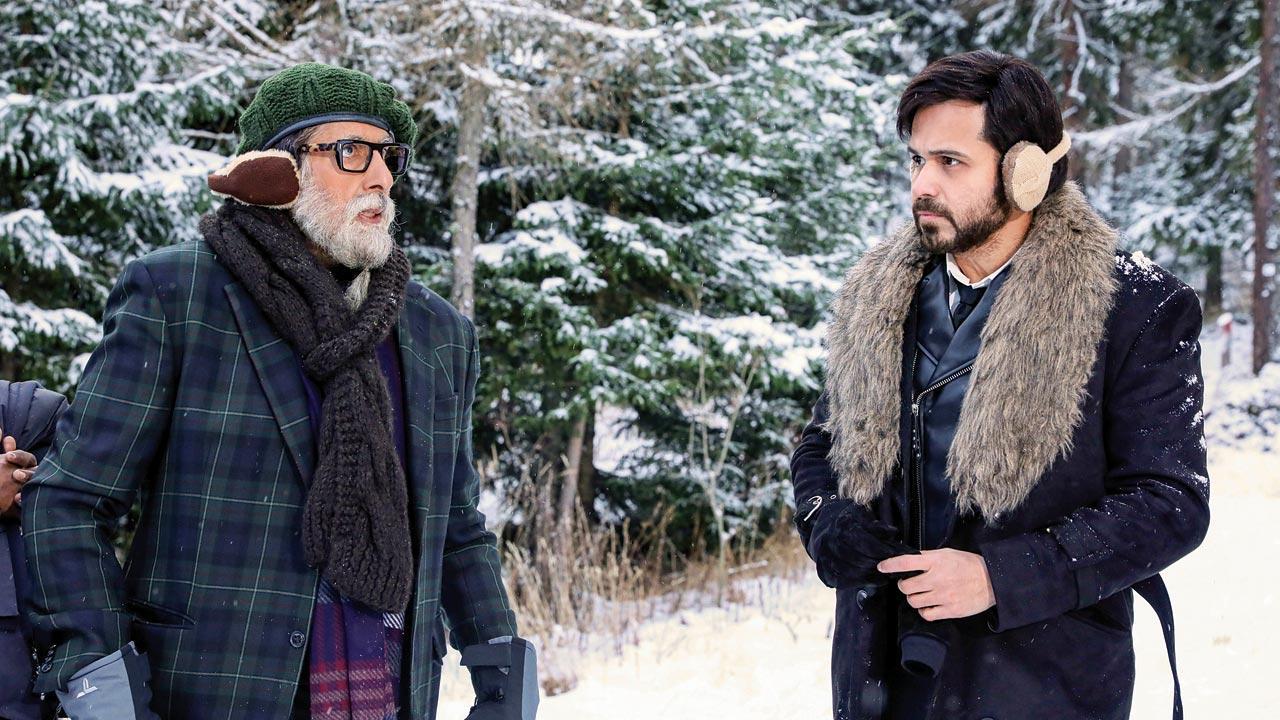The madness of this movie, about a non-existent case in a fake trial, is nothing compared to what Chakraborty had to go through herself

A still from Chehre
Chehre
U/A: Drama, mystery
Dir: Rumi Jaffery
Cast: Amitabh Bachchan, Emraan Hashmi
Rating: 1.5/5
A sales representative, whose car breaks down during a trip, finds lodging for the night in a house of a retired judge. The host invites him to participate in a game that the judge and his three friends—a former prosecutor, a defense attorney, and a public hangman—play over dinner. The game in question is a pretend-trial, in which he [the sales rep] will be defendant. During cross-question, it transpires that he may have caused death of his boss by heart attack…”
I could obviously carry on writing—plus revealing inadvertently spoilers after spoilers—over what reads like the story of this film, Chehre. Except, I’ve only quoted from the Wikipedia page, word for word, the plot summary thus far—of Friedrich’s Durrenmatt’s novel, A Dangeorous Game (1956).
Watch Video
Only that the writing of Chehre in the opening credits is wholly/solely attributed to Ranjit Kapoor. Two lawyers and a judge, albeit retired, plus a kangaroo court, are at the centre of this script. Few minutes into the film though, you’d think it was about imminent dangers of climate change!
Also Read: Emraan Hashmi: You are only as good as script and director
The hero, an ad man (Emraan Hashmi) is seen driving through thickly Arctic layers of snow—as mentioned in the movie, only over 200 kilometres from Delhi! The setting, without polar bears, is mysteriously described as a place where the weather periodically alternates between icy rains, hail storm, and scorching sun! Which is where the hero’s car must stop, before a tree that’s fallen.
What follows is a couple of hours of an indoor drama. Chiefly starring three old men in a Siberian mansion, where Hashmi’s character spends a night of random interrogation. A fairly transformed Annu Kapoor, banging it with his Sardar/Punjabi twang, is the former defense counsel.
Which also sort of reminded me of Kapoor from Basu Chatterjee’s Ek Ruka Hua Faisla (1986)—similarly a one-room, intensely talkie drama—shamelessly stolen, without a word of acknowledgement, from Sidney Lumet’s Twelve Angry Men (1956).
That, in turn, was based on a stage production. Guess who was credited for writing Ek Ruka Hua Faisla, besides Chatterjee himself? Same as the writer of Chehre: Ranjit Kapoor!
This is, of course, effectively a play. The camera steps out of the solitary location only a couple of times. Dhritiman Chatterjee is the judge. Amitabh Bachchan plays the public prosecutor, although billed for “special appearance” in the film.
Also Read: Rumy Jafry: Don't think 'Chehre' will benefit or suffer due to Rhea
Press reports suggest he didn’t charge a paisa for the part as well. In terms of lines/dialogue alone, Bachchan has a role long enough to be lead—over everyone else in this faux court-room drama anyway.
Especially when you consider the soliloquy the filmmakers predictably save for him towards the end. A frustratingly never-ending monologue, so unrelated to everything the film has been about thus far, that while you still appreciate the effort that’s gone into giving everything a larger purpose, you realise the movie itself has no point to make at all.
If it wasn’t for Bachchan, that problematic monologue—strangely interpreting law and justice as a system that should have no place for reformation or pardon—would have sounded like verbal diarrhoea, from a tone-deaf dude. To be fair, Big B makes more interesting, impromptu conversations on his quiz show KBC.
To be fairer still, the cast gives this screenplay the credibility it may not deserve. Maybe the actors walked right into what they sensed was a clever script. In a meta sort of way, the only time I felt anything for a character, it was a girl who plays the house-help in this movie.
Even for the few minutes she appears on screen, Hashmi’s character harasses her; in lieu of seducing her, apparently. She has a deliberately imbecilic laugh. Look closer, you’ll recognise this actor as Rhea Chakraborty—singularly known for the witch-hunt and media trial against her, that followed the death of actor Sushant Singh Rajput in 2020.
Mainstream press and social media handles played judge, prosecutor and hangman in that case, involving the death of her boyfriend. The madness of this movie, about a non-existent case in a fake trial, is nothing compared to what Chakraborty had to go through herself.
I felt terrible for her, of course—much more than for those who have to sit through this movie in a proper theatre, which is where it’s released. A casual switch of the button on an OTT platform for lockdown-level entertainment is about as far as I’d be willing to go with it.
Also Read: Rhea Chakraborty: Take a minute and say thank you, gratitude is powerful
 Subscribe today by clicking the link and stay updated with the latest news!" Click here!
Subscribe today by clicking the link and stay updated with the latest news!" Click here!









